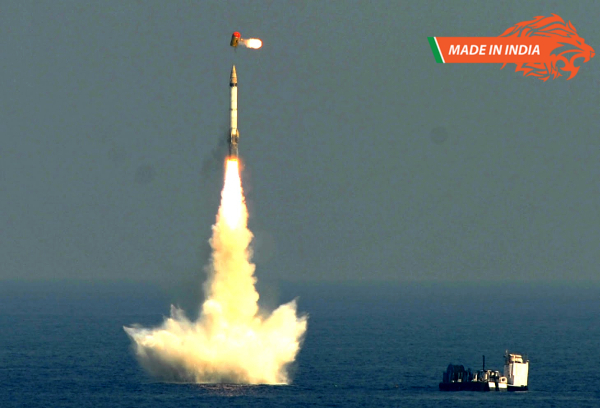India has made progress in the development of its K-5 submarine-launched ballistic missile (SLBM), a new report has revealed.
The nuclear-capable missile, which will arm India’s future ballistic missile submarines (SSBNs), is likely to be tested by the Defence Research and Development Organisation (DRDO) in the next 15 months, the report says.
K-5 is the third SLBM that India is working on.
India’s first SLBM, K-15, has already entered service. It arms INS Arihant, the only operational SSBN that India currently has. This missile, tested extensively over the years, has a stated range of around 750 kilometers.
Given its short range, the K-15 can’t hit Chinese population and industrial centers during a conflict unless the submarine it is being launched from reaches close to the Chinese coastline in the South China Sea. Doing so during a conflict, experts say, will make the submarine more vulnerable to attacks.
India is developing K-4 and K-5 SLBMs to end this limitation.
While the K-4 has a range of around 3,500 kilometers, the K-5 can hit targets nearly 5,000 kilometers away. Using a K-5, experts say, an Indian SSBN can hit targets of strategic value in China from the Indian Ocean.
India has tested the K-4 SLBM multiple times in the past. In January this year, the missile was tested twice in five days. Reports say the development of the missile is complete and it is ready to enter series production.
The K-5, however, is still in development and hasn’t been tested before.
India’s second SSBN, INS Arighat, is currently undergoing trials. It is likely to enter service in the next six months, reports say.
Source: Swarajya Mag
You may also like
-
IAF Aircraft Set Course For Exercise Eastern Bridge VII At Oman
-
IAF Set To Host The Indian Defence Aviation Exposition-II At Jodhpur
-
Defence Secretary to co-chair 5th India-Philippines Joint Defence Cooperation Committee meeting in Manila
-
Simultaneous Launch Of ‘malpe And Mulki’, Fourth And Fifth Ships Of Asw Swc (Csl) Project
-
Aatmanirbharta in Defence: MoD signs Contract with HAL for 240 AL-31FP Aero Engines for Su-30MKI Aircraft
